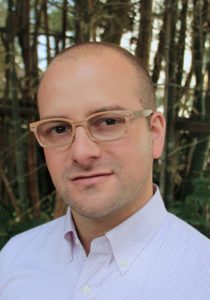Tap into the collective power of influential business and NGO pioneers to create new strategies and
tactics to build a more socially and environmentally conscious world.

Tap into the collective power of influential business and NGO pioneers to create new strategies and
tactics to build a more socially and environmentally conscious world.
John Pabon
Company/NGO Name:
Fulcrum Strategic Advisors
Region, Country:
Based in Hong Kong and Shanghai, China

1. What is the mission of your company/ngo?
The business world has entered a new era. Names like Alibaba and Tencent, unheard of five years ago, now dominate technological innovation and profitability. Holding firms like The Hainan Group are going on global buying sprees. Yet, most western companies are asleep at the wheel. Many use outdated strategies and approaches to everything from market intelligence to communications, sustainability to government relations. The result are very public missteps, a loss of market share, and erosion of soft power once inherent in western brands.
But, the pivot to Asia doesn’t have to mean the end of western competitiveness.
We’re pragmatists that believe there is a better way forward and see ourselves as the fulcrum on which the next Asian Century pivots. At Fulcrum, we work with businesses to understand and take advantage of the complex policy landscape across Asia. Sustainability is core to this as regional governments explore ways to ensure a better future for their citizens.
2. What is the most innovative or environmentally/socially impactful project/practice your company/NGO has implemented?
I had the privilege of working together with a major global tech firm to create China’s first app designed for the blind and visually impaired. The app provides this population with services they otherwise would not be able to access. In China, where social safety nets sometimes missed disabled populations, this app is helping ensure self-sufficiency among the country’s 5 million blind and visually impaired.
 3. Please share any new projects you will be implementing in the near future.
3. Please share any new projects you will be implementing in the near future.
Currently, Fulcrum is working with a number of western food and agriculture companies to develop marketing and messaging unique to the Chinese market. China is a country where food scarcity, and overabundance, are prevalent. It is also a place where provenance is sometimes questionable. These western companies aim to not only sell product in the market, but also educate consumers on what high quality, nutritious food can be.
4. What are your top 3 career accomplishments?
I’ve been very proud of simply working in this field. Everything sustainability professionals do, day in and day out, is among the most noble of callings.
Three of my greatest contributions would have to be:
5. What inspired you to choose your career path?
I’ve always been an altruist, but a more pragmatic one than most. I never associated myself with environmentalists (I love to get on a plane and travel!), and I didn’t feel going back to the Stone Age or living off the grid made sense either. Because of that, I decided to work with business, versus against it, in creating a more sustainable future.
For me, business has the biggest potential for impact. As individuals, whether consumers or as private citizens, we can only do so much. A Fortune 500 company, however, can really make lasting positive change if they do things right. With proper operations in place, and hopefully a great bit of marketing as well, this should inspire other companies to follow suit. That virtuous cycle is what is going to ensure our future.
6. What is/are the biggest incentive(s) for businesses in your country to adopt sustainable practices?
I wouldn’t say there is necessarily an incentive at this stage for Chinese domestic companies to be more sustainable. The impetus for them becoming so, however, is coming from the Government. Policies, practices, and targets at all levels of government impact how businesses are run. If I’m a local bureaucrat that has my career tied to achieving certain environmental targets, I’m definitely going to make sure companies in my area help me meet that goal.
For foreign businesses operating here, sustainability is a way to help support critical Governmental policies and differentiate against competitive domestic firms. It’s also assumed foreign companies are more seasoned in sustainability. It looks particularly bad if they aren’t practicing locally what they preach globally.
7. What is/are the biggest environmental or social challenge(s) facing your country today?
In its economic rise, China battled environmental pollution. At this stage the situation certainly isn’t perfect. But, the Government has strong measures in place changing things for the better. You see this with vastly improved air quality, and most recently targets around water effluents and cleanliness.
Now, the biggest future challenge for China is in food security. Having enough food to feed its growing population is going to be a bigger problem over time. What’s more, those with higher disposable income are developing bad nutritional habits. This has resulted in China now being the world’s most overweight country.
Balancing the need for food, with an overabundance of it, will be a telling challenge for China over the next decade.
 8. What is the most positive action your country has taken to positively impact its environment or social well-being?
8. What is the most positive action your country has taken to positively impact its environment or social well-being?
The single biggest thing China is currently doing to ensure a more sustainable future for all is through investing in innovation and green technologies. Last year, China spent more than US$360 billion, twice the entire European Union, on green technologies. The Government is also encouraging personal responsibility through tax incentives for green purchases and business models.
Bonus Questions:
1. What are the biggest challenges you have faced when pursuing or trying to promote sustainable practices/projects?
The biggest challenge we as sustainability professionals face is that people just don’t understand what we’re talking about. Over the past 30 years, we’ve made sustainability so inaccessible that now people’s eyes glaze over when we start talking. We use loaded terms like green and LOHAS, CSR and inclusion. If you ask 5 people to define these words, you’ll likely get 30 different answers. We’ve also become so good at scaring people (the world’s ending, polar bears are drowning, kids are starving) the individual sits back and wonders what in the world they can do to actually make a positive impact.
What we need to do, and what I find most helpful in my conversations, is to find a new starting point. This is a point where we use the language of business, of the person we’re speaking to, and not our own “sustainability speak”, to bring others on the journey with us.
To learn more, please visit John and the Fulcrum team on their websites and social media:
John Pabon’s website “John’s Little Green Book”